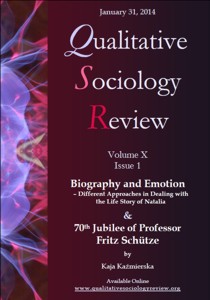Badges of Social Valuing and the Biography. Natalia’s Interview in the Perspective of Sociologist of Poverty and Social Exclusion
DOI:
https://doi.org/10.18778/1733-8077.10.1.03Keywords:
Biography, Poverty, Marginalization, Social Valuing, Stigmatization, Badge of Ability, Badge of InabilityAbstract
The paper presents an attempt to analyze the interview with Natalia within the framework of sociology of poverty and from a social exclusion perspective. The information about the origins of Natalia’s interview is delineated. In the main part of the text, the author refers to the concept of the badge of ability, described by Richard Sennett and Jonathan Cobb, as a tool of social categorizing and valuing and introduces the corresponding notion of the badge of inability, ascribed to the unprivileged group members. Furthermore, the influence of both kinds of badges on the situation of Natalia’s family of origin, on her life course, and self-description are indicated with some remarks on the narrator’s biographical and identity work. The last part of the paper presents the narrator’s understanding of the world of poverty and social exclusion, its mechanisms, and conditionings.
Downloads
References
Abramovich, Samuel, Christian Schunn, and Ross Mitsuo Higashi. 2013. “Are badges useful in education?: It depends upon the type of badge and expertise of learner.” Educational Technology Research and Development 61(2):217-232.
Google Scholar
DOI: https://doi.org/10.1007/s11423-013-9289-2
Becker, Howard S. 1966. Outsiders. Studies in the Sociology of Deviance. New York: Free Press.
Google Scholar
Corbin, Juliet and Anselm L. Strauss. 1988. Unending work and care: Managing chronic illness at home. San Francisco: Jossey-Bass.
Google Scholar
EUROCHILD WORKING PAPER. 2012. De-institutionalisation and quality alternative care for children in Europe. Lessons learned and the way forward. Retrieved July 4, 2013 http://www.eurochild.org/fileadmin/ThematicPriorities/CIAC/Eurochild/Eurochild%20Working%20Paper%20-%20DI%20%26%20Quality%20Alternative%20Care%20FINAL.pdf
Google Scholar
Garfinkel, Harold. 1956. “Condition of Successful Degradation Ceremonies.” American Journal of Sociology 61(5):420-424.
Google Scholar
DOI: https://doi.org/10.1086/221800
Goffman, Erving. 1981. Stigma. Notes on the management of spoiled identity. Harmondsworth: Penguin Books.
Google Scholar
Golczyńska-Grondas, Agnieszka. 1998. ”Postawy pracowników instytucji społecznych wobec klientów z enklaw.” Pp. 184-200 in Żyć i pracować w enklawach biedy, edited by W. Warzywoda-Kruszyńska. Lodz: Instytut Socjologii UŁ and Agencja Wydawniczo-Projektowa Anagraf.
Google Scholar
Golczyńska-Grondas, Agnieszka. 2009. ”The Interplay between Personal Identity and the Others. Interaction Partners and Competitors of all Kinds.” European Studies on Inequalities and Social Cohesion 1:83-101.
Google Scholar
Golczyńska-Grondas, Agnieszka. 2014. ”We were brought up by the State.” About the identity of the adult leavers of children’s residential care institutions. Cracow: Nomos.
Google Scholar
Helling, Ingebor K. 1990. ”Metoda badań biograficznych.” Pp. 13-37 in Metoda biograficzna w socjologii, edited by J. Włodarek, M. Ziółkowski. Warsaw, Poznan: Państwowe Wydawnictwo Naukowe.
Google Scholar
Jacyno, Małgorzata. 1997. “Kontrkultura ubóstwa. Pierre’a Bourdieu koncepcja reprodukcji klas społecznych a problem reprodukcji otwartej.” Studia Socjologiczne 3:110-121.
Google Scholar
Jankowski, Bogdan and Wielisława Warzywoda-Kruszyńska. 2010. Mieszkańcy łódzkich enklaw biedy 10 lat później. Łódź: Wydawnictwo ”Biblioteka.”
Google Scholar
Kalbarczyk, Agnieszka. 2013. “Wizje biedy i wykluczenia społecznego w praktyce polskiego systemu pomocy społecznej.” Pp. 227-299 in Dyskursy biedy i wykluczenia społecznego, edited by E. Tarkowska. Warsaw Wydawnictwo IFiS PAN.
Google Scholar
Meighan, Ronald. 1993. Socjologia edukacji. Torun: Uniwersytet Mikołaja Kopernika.
Google Scholar
Nakagawa, Shinichi et al. 2007. ”Does the badge of status influence parental care and investment in house sparrows? An experimental test.” Oecologia 153(6):749-760.
Google Scholar
DOI: https://doi.org/10.1007/s00442-007-0765-4
Potoczna, Małgorzata. 1998. “Strategie życiowe biednych mieszkańców enklaw.” Pp. 68-98 in Żyć i pracować w enklawach biedy, edited by W. Warzywoda-Kruszyńska. Lodz: Instytut Socjologii UŁ and Agencja Wydawniczo-Projektowa Anagraf.
Google Scholar
Potoczna, Małgorzata and Wielisława Warzywoda-Kruszyńska. 2009. Kobiety z łódzkich enklaw biedy. Bieda w cyklu życia i międzypokoleniowym przekazie. Łódź: Wydawnictwo Uniwersytetu Łódzkiego.
Google Scholar
Raczkowska, Jadwiga. 1983. Wychowanie w domu dziecka. Warsaw: WSiP.
Google Scholar
Sajkowska, Monika. 1999. Stygmat instytucji: Społeczne postrzeganie wychowanków domów dziecka. Warsaw: ISNS UW.
Google Scholar
Schütze, Fritz. 2009. “Biography Analysis on the Empirical Base of Autobiographical Narratives: How to Analyse Autobiographical Narrative Interviews.” European Studies on Inequalities and Social Cohesion, 1/2:153-242 (part I) and 3/4:5-77 (part II).
Google Scholar
Sennett, Richard and Jonathan Cobb. 1972. The Hidden Injuries of Class. New York, London: W.W. Norton & Company.
Google Scholar
Strauss, Anselm L. 1969. Mirrors and Masks The Search for Identity. Mill Valley, CA: Sociology Press.
Google Scholar
Strauss, Anselm L. et al. 1985. Societal Organization of Medical Work. Chicago: Chicago University Press.
Google Scholar
Tarkowska, Elżbieta, (ed.). 2013. ”Bieda, ubóstwo i inne kategorie dyskursu akademickiego w Polsce.” Pp. 49-88 in Dyskursy biedy i wykluczenia społecznego. Warsaw: Wydawnictwo IFiS PAN.
Google Scholar
Wacquant, Loïc. 2001. “The Penalization of Poverty and the Rise of Neo-Liberalism.” European Journal on Criminal Policy and Research 9(4):401-411.
Google Scholar
DOI: https://doi.org/10.1023/A:1013147404519
Zakrzewska-Manterys, Elżbieta. 2009. “Przedmowa do wydania polskiego.” Pp. VII-XXI in Howard S. Becker, Outsiderzy. Studia z socjologii dewiacji. Warsaw: Wydawnictwo Naukowe PWN.
Google Scholar
Downloads
Published
How to Cite
Issue
Section
License

This work is licensed under a Creative Commons Attribution-NonCommercial-NoDerivatives 4.0 International License.











